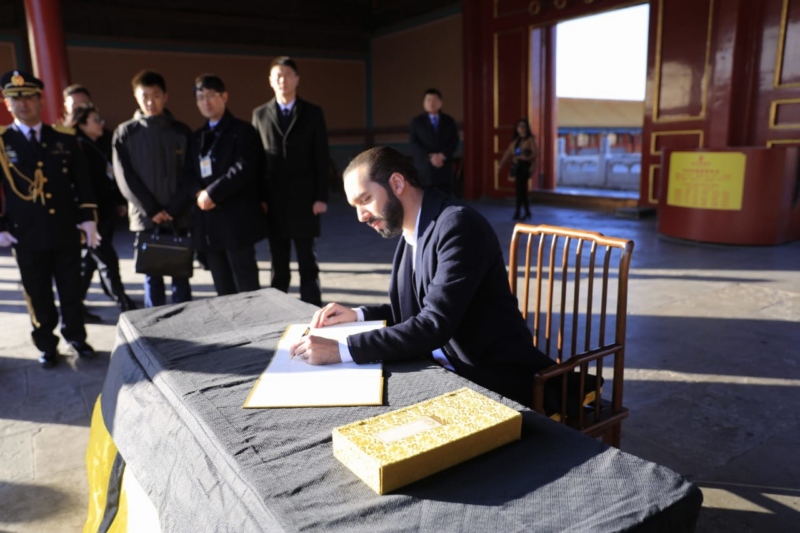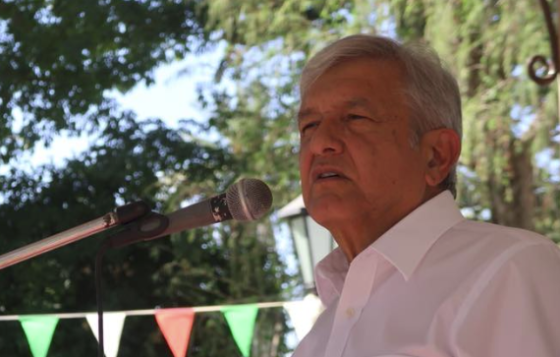
Will Colombia’s New President Deliver on His Promises?
Iván Duque, a conservative former senator, on Sunday won Colombia’s presidential runoff election. What does it mean for the country?
A Daily Publication of The Dialogue
China will help El Salvador build several new infrastructure projects, including a water treatment plant and a stadium, as well as streets, parks and a water system in coastal tourist areas, the two nations announced Dec. 3, as Salvadoran President Nayib Bukele visited his counterpart in Beijing. Is El Salvador’s recent decision to cut ties with Taiwan in favor of establishing them with China paying off? What benefits will the infrastructure program bring to the Central American nation, and does Chinese investment come at a price? Through such projects, can El Salvador become a realistic competitor for tourism in the Central America region?
Margaret Myers, director of the Asia & Latin America program at the Inter-American Dialogue: “Bukele’s agreements with China, though described as ‘gigantic,’ are little more than a series of development assistance projects totaling a few hundred million dollars. They are a far cry from the original Belt and Road-type projects proposed to the FMLN when Sánchez Cerén broke ties with Taiwan in August 2018. The originally proposed renovation of the La Unión port and a related special economic zone—though exceedingly problematic, having been negotiated entirely behind closed doors—could (if considerably re-worked or re-imagined) have been sizable and potentially transformative projects for the Salvadoran economy. Beijing might also have accepted other major infrastructure proposals from the Bukele government. However, in a seeming effort to gain something from newly established relations with China while limiting reactions from the United States, Bukele struck a series of deals with Beijing that are reminiscent of the sort of projects that China offered Central America and the Caribbean in the early 2000s, when China and Taiwan engaged in relatively unchecked dollar diplomacy in those regions. The stadium, in particular, is a throwback to that period of time—Costa Rica’s 2007 soccer stadium was among the last gifted by China in Latin America and the Caribbean. Some of the newly promised projects will very likely have a positive impact in certain parts of the country. And there is probably more to come from China, although that will again be limited by pressure from the United States. At this juncture, though, it’s hard to say that El Salvador is benefiting more from newly established relations with China than it did from ties to Taiwan.”
Guo Jie, associate professor at Peking University’s School of International Studies: “Chinese president Xi Jinping invited Nayib Bukele to visit China soon after he took office with the intention of further cementing the countries’ newly established bilateral relations. During the visit, China promised to grant strong aid through building several major infrastructure projects in El Salvador. It is no secret that the United States has been pressuring the Central American country to break ties with China. Therefore, China’s move is, to a large extent, a response to U.S. pressure and has little to do with the Taiwan factor. In the joint statement issued after the meeting between the two leaders, in addition to reaffirming adherence to the One-China principle, it also specifically mentioned that the projects mentioned above ‘are the result of the efforts of the new Salvadoran government led by Bukele.’ Associated with Bukele’s comments on China and on his country’s relationship with China at the Heritage Foundation last March—which, objectively speaking, contained substantial groundless accusations—a prominent impression is that what the young president is really concerned about is still the country’s realistic interests, rather than the accusations he mentioned. China, for its part, directly responded to it. Since 2017, China has established diplomatic ties with Panama, the Dominican Republic and El Salvador, three long-time allies of the United States. This, on the one hand, reflects to some extent the weakening of U.S. influence in Latin America, while on the other hand, it highlights the pragmatism of these countries in handling their relations with China. For China, further expanding its economic, political and diplomatic engagement with the region, is also of practical significance.”
Ricardo Cevallos, partner at BLP Abogados in El Salvador: “Traveling to attract business opportunities for the country has raised President Bukele’s approval ratings. Getting deals such as this one with the Chinese government has attracted the attention of the younger population that largely elected him. He has charmed his social media followers, posting pictures and information about his meetings. Water treatment plants are badly needed in El Salvador, a densely populated country with failed water management policies. A stadium and the improvement of one of its beaches are not at the top of most of the population’s priorities, but all of them will help continue to increase his popularity and maintain it for months to come. It is unclear what implications these new ties with the Chinese government will bring, but one thing is certain: the United States is watching this move closely. The same day he announced them, the U.S. ambassador warned that ‘Chinese cooperation is not as beneficial as it seems to the receiving country.’ Projects such as the ones offered (if built only by Chinese companies and workers) will not affect the economy as much as they could, and they will add to the tourism industry in El Salvador, but much still needs to be done regarding infrastructure and safety if the country wants to attract more tourists when competing with neighboring countries that have benefited from large influxes of tourists for decades. Bukele has scored some points, and his popularity is at an all-time high. Optimism is up and there is interest from foreign companies to come and engage in new businesses in the country, but few of his ideas have translated into tangible ventures that generate new job opportunities and much-needed development.”
Ray Walser, retired foreign service officer and professor of practice at the School of Diplomacy and International Relations in Seton Hall University’s Semester in Washington program: “After promising transformative and progressive change to the people of El Salvador, a youthful, energetic President Nayib Bukele must be perceived as delivering. The red-carpet treatment lavished upon him by President Xi Jinping and company in early December certainly elevates Bukele’s stature as an international player. The Chinese investment packet, moreover, was proffered despite Bukele’s earlier criticism about China not playing by the rules and ‘meddling in democracy.’ It also raises questions about the future of a proposed, China-friendly ‘special economic zone.’ While specific details, priorities and promised expenditures remain unclear, El Salvador’s pressing need for infrastructure investment and development engines is ever present. That Chinese investments can, given extensive regional competition, turn El Salvador into a preferred tourist destination is questionable. As Bukele settles into his presidency, one assumes El Salvador will continue to walk the line between the United States and China. At the time of his inauguration, Bukele described the United States as El Salvador’s ‘natural number-one ally.’ Migration issues, remittances, CAFTA, law enforcement cooperation and other links will keep El Salvador mindful of remaining in the U.S. orbit. However, Bukele appears to have slammed the door on re-recognizing Taiwan. How El Salvador votes on issues of concern to China in the United Nations or supports ‘the peaceful reunification of China’ will likely be the first signs of a quid pro quo. For now, Beijing will claim that it has placed another scalp on its Belt and Road Initiative and advanced its ongoing quest for strategic footholds in the Americas at Washington’s expense.”
The Latin America Advisor features Q&A from leaders in politics, economics, and finance every business day. It is available to members of the Dialogue's Corporate Program and others by subscription.
Iván Duque, a conservative former senator, on Sunday won Colombia’s presidential runoff election. What does it mean for the country?
Mexicans go to the polls on Sunday, July 1, for the country’s presidential, legislative and local elections. What can we expect?
Leftist Andrés Manuel López Obrador swept to victory Sunday in Mexico. What changes are in store?
 El Salvador’s President, Nayib Bukele, signed new cooperation accords in China earlier this
month. // Photo: Salvadoran government.
El Salvador’s President, Nayib Bukele, signed new cooperation accords in China earlier this
month. // Photo: Salvadoran government.

